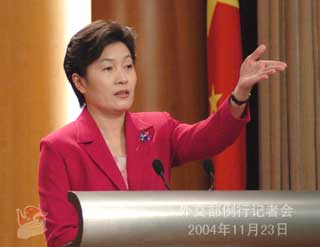|
Spokeswoman: EU's arms embargo a 'political' issue
By Wu Chong (China Daily)
Updated: 2004-11-23 01:00
China said Tuesday that removing the European Union's ban on arms sales to
China does not necessarily mean China will increase imports of weapons from the
EU.

Chinese Foreign
Ministry Spokeswoman Zhang Qiqyue takes a question at a news briefing in
Beijing November 23, 2004. She urged the EU to lift arms sale ban on
China. [fmprc.gov.cn] | With a clear stand that EU
should remove the arms embargo soon, a spokeswoman for China's Foreign Affairs
Ministry said, "we hope the EU can make more contributions to the overall
development of Sino-EU relations rather than placing some obstacles." At
Tuesday's regular press briefing, Zhang Qiyue said lifting the 15-year-old
embargo is a matter of "political principle," and China hopes the EU can make
the right decision as soon as possible.
Dutch Foreign Minister Bernard Bot hinted on Monday that the EU may be ready
to move in that direction during an EU-China summit to be held in The Hague on
December 8, while the Netherlands holds the EU's rotating presidency.
Beijing-based observers remained cautiously optimistic.
"It would be difficult for the 25-nation bloc to reach a decision on the
issue by next March," said Gu Junli, an expert with the Chinese Academy of
Social Sciences (CASS), although he envisaged that EU may have found a
compromise proposal to solve the problem.
"They might revise some provisions, add more restrictions or even lay out a
new code of conduct on arms sales," Gu said.
The EU is divided over whether to end its arms export ban to China, which was
imposed after 1989. Though France and Germany are in strong favour of lifting
the ban, a couple of other EU members still oppose the proposal.
Gu also criticized some countries' tie-up of the embargo with so-called human
rights issues. "It is nonsense. These years have witnessed China actively
involved in frequent dialogues with other countries on human rights," said Gu.
"The EU should value the strategic partnership with China and make the right
decision soon to ensure a more stable development of bilateral relations," the
expert said.
Viet Nam
Also at Tuesday's briefing, in response to Viet Nam's criticism of China's
oil exploration in the South China Sea, Zhang said China cannot accept an
accusation without proof.
She said Kantan III, one of China's oil drilling platform, is located in
China's territorial waters in the mouth of the Beibu Gulf.
Therefore, it is conducting a legal oil exploration, she noted.
"The Chinese side followed international practice to make an announcement of
navigation in advance through the sea affairs authority to guarantee the safety
of passing ships."
Zhang said China is willing to exchange views with Viet Nam on this regard.
Viet Nam said China should cancel its oil drilling plan in the South China
Sea, by claiming it would infringe on its sovereignty.
Progress in Iran
Zhang said Iran's decision to suspend its nuclear programme would create
favourable conditions for the United Nations International Atomic Energy Agency
(IAEA) to solve the nuclear issue.
The IAEA board of governors passed a resolution in September demanding Iran
stop all enrichment programmes before November 25.
Iran announced on November 15 that his country would stop all uranium
enrichment-related activities.
Shrine Visits
China and Japan's historical problems are the obstacles that they both have
to face, said Zhang. The most inflammatory issue in Sino-Japanese relations
is Japanese leaders' unflagging visits to Yasukuni Shrine.
With 14 Class-A World War II criminals enshrined, along with other Japanese
war dead since the mid-19th century, Yasakuni Shrine has become a symbol for
Chinese as well as Asian people.
This topic has been included in the conversation between Chinese President Hu
Jintao and Japanese Prime Minister Junichiro Koizumi, which took place after the
conclusion of the 12th Economic Leaders' Meeting of the Asia-Pacific Economic
Cooperation forum.
During the meeting, Hu urged Japanese Prime Minister to properly treat its
wartime history with an eye to the future, and called for a halt to visits by
Japanese leaders to the shrine.
When asked about the impact of Sino-Japanese leaders meeting on November 21,
Zhang said that the meeting tells the importance Chinese leaders have put on the
Sino-Japanese relations.
For more than 32 years, China has witnessed the noticeable development
between it and Japan, said Zhang. The fruits should be treasured and both
countries should exert more positive efforts to the relations.
| |
 |
|
 |
|
|
Today's
Top News |
|
|
|
Top China
News |
 |
|
 |
|
|
|
|
|
|


